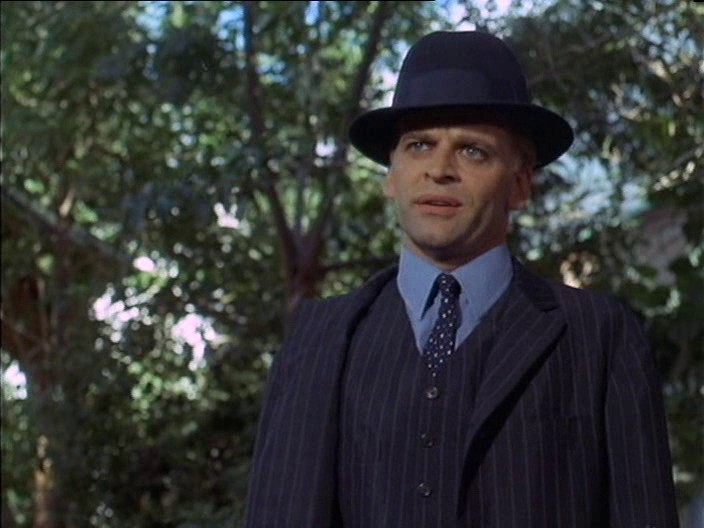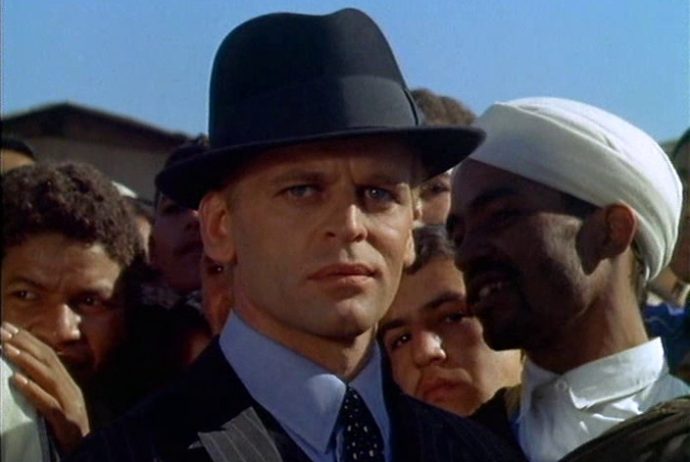Dir: Don Sharp
Star: Tony Randall, Senta Berger, Herbert Lom, Klaus Kinski
a.k.a. Bang Bang, You’re Dead
In the sixties, the worldwide success of James Bond spawned any number of spy capers, from the serious through to the pure spoof. This likely skews towards the latter end of the spectrum, playing the “fish out of water” card heavily. However, the story is staggeringly dull, and the direction fails to do much to elevate things. The end result can only be considered a sad waste, both of the exotic and picturesque North African locations, and a cast which is full of faces you’ll probably recognize. In particular, Kinski gets hardly anything to do, and even less to say, in his role as Jonquil, the chief henchman of Mr. Casimir (Lom).
Casimir is awaiting the arrival in Marrakesh of a courier, bearing a payment of two millions dollars, which will be used to influence votes on behalf of “the People’s Republic” (presumably China, though it’s never made explicit) at an upcoming United Nations meeting. The problem is, he doesn’t know who the courier is, just that they are arriving on a shuttle bus from the local airport. There are a slew of potential candidates, and this is partly where the casting really takes off, as we meet them all on the way into the city. First up is sanitation salesman Arthur Fairbrother (Wilfred Hyde-White). Then here’s holiday company executive George C. Lillywhite (John Le Mesurier). Worker for Iranian Oil, Andrew Jessel (Randall). Vacationing model Kyra Stanovy (Berger). And last but not least, keeping an eye on them is Casimir’s moll, Samia Voss (Margaret Lee), with Jonquil following the bus.
On reaching the hotel, things settle down a bit, with Andrew finding a corpse stashed in his room. It appears it was intended for Kyra, and the pair team up to dispose of the body. It’s quickly clear that she is considerably more savvy than he about the murky world into which he has dropped, and together they navigate the shady doings of spy-craft in sixties Morocco, where just about nobody is who they claim to be. Casimir initially mistakes Jessel for the courier. When the truth comes out, Jessel escapes, but mistakenly picks up Casimir’s highly incriminating briefcase in the confusion. This leads to he and Kyra being pursued through the desert, as they initially try and make their way to Algiers, before doubling back to confront Casimir in a set of Marrakesh ruins, with the help of Bedouin El Caid (Terry-Thomas), as all is revealed.

To go through the cast and where you probably know them from:
- Lom was Chief Inspector Dreyfus in the Pink Panther films [Burt Kwouk, who played Clouseau’s man-servant Cato in the series, has a bit part here]
- Hyde-White was Colonel Pickering in My Fair Lady
- Le Mesurier played Sergeant Arthur Wilson in long-running BBC sitcom, Dad’s Army
- Randall was half of The Odd Couple, a successful US sitcom
- Lee appeared perhaps more than anyone else with Kinski, appearing in 12 films together including Psycho-Circus (1966), Five Golden Dragons (1967) and Venus in Furs (1969)., many of them, like this, produced by Harry Alan Towers.
- Terry-Thomas may be best known for the St. Trinian’s movies, but was almost ever-present in British comedies of the sixties.
- Don Sharp directed some of the, frankly, less impressive Hammer films such as Kiss of the Vampire (1963) and The Devil-Ship Pirates (1964)
Most of the performers do reasonably well with their roles. Le Mesurier and Hyde-White in particular manage to capture the essence of the British Empire, while also giving the impression there’s something more under the surface (and without spoiling anything, in both cases that proves to be the case). Randall is decent enough as the wide-eyed innocent abroad, though the speed with which he agrees to help Kyra get rid of a corpse is pretty implausible. I know she’s pretty ‘n’ stuff, but I’d definitely be exploring other options. However, it’s also surprisingly progressive in that the character of Kyra Stanovy is a strong. independent woman, who leads Jessel more than she is led. It’s quite a sharp contrast to Bond girls of the time who, after an encouraging start in the franchise, were increasingly little more than eye-candy.
Unfortunately, none of the cast are able to make much impression on a plot which is established inside about ten minutes, then goes virtually nowhere until the final ten. In between, there’s almost nothing to keep you interest between some moderately pleasant scenery. The only bit which will stick in my mind is they’re being captured by El Caid, who turns out not to be a savage, but an Old Etonian with perfect manners. It’s a lovely bit of playing against stereotype, which renders the casting of Terry-Thomas in brownface nearly palatable. But almost everything else in an absolute trudge, and even Kinski is little more than well-dressed wallpaper, lurking in the background and waiting for something to happen. The audience will be doing the same, and I’d suggest bringing a cup of coffee and some snacks to this one.

While the film does not merit being mentioned by name, in his autobiography Klaus does spend several pages apparently discussing his adventures shooting this in Morocco. It’s mostly sex: he hails a passing women in the street like a cab, almost gets gang-raped by a pair of local men and (taking the usual caveat about believing Kinski as read) “fools around with” Lee, Berger and Towers’ wife at the time, Margaret Rohm (he call her Towers’ “steady girlfriend,” but they married in 1964). With all that going on, I’m surprised he found time to learn his lines. But I was amused by this passage:
When I piss on a palm tree, it stings like nettles. I’ve got the clap again. There’s no time for me to go to the doctor. He comes to give me an injection. We’re filming in a palace. Between sessions I slip out with the doctor to the gallery above the tea room. I let my pants down and get the penicillin right in the ass. The director is already calling me back.
All I Need is Love, pp 167-168.
